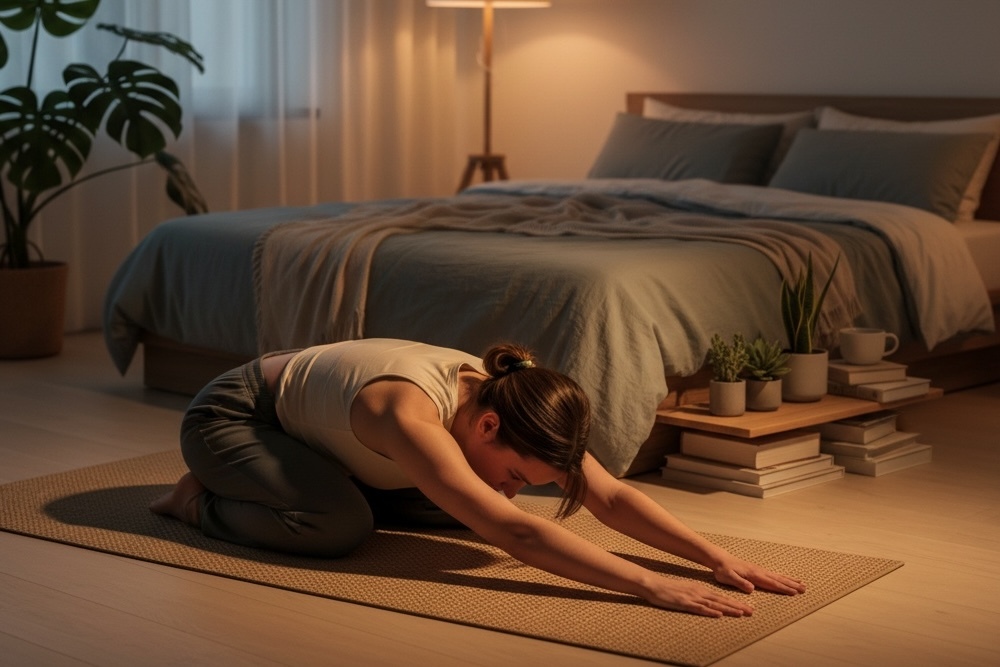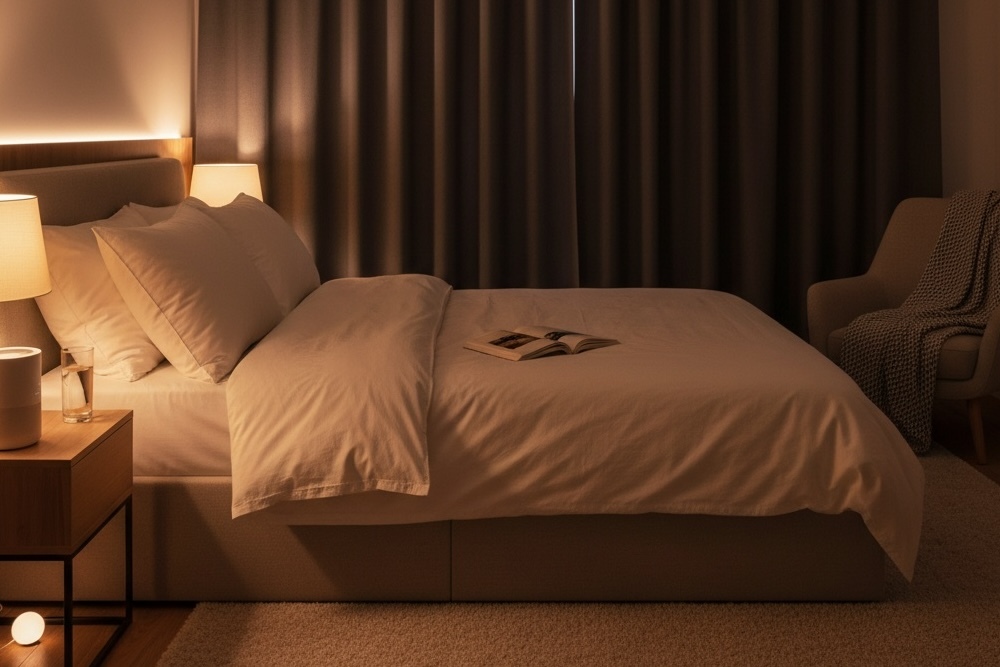How to Improve Your Sleep Quality for Better Health
Ava Welles
2025-09-03
6 min read

Sleep is not a luxury—it's a biological necessity that affects every aspect of our health and well-being. Yet millions of people struggle with poor sleep quality, tossing and turning through the night or waking up feeling unrested despite spending eight hours in bed. The good news is that sleep quality can be dramatically improved through evidence-based strategies that address both the behavioral and environmental factors that influence our nightly rest.
Understanding the Foundation of Quality Sleep
Quality sleep involves more than simply closing your eyes for eight hours. It encompasses the ability to fall asleep relatively quickly, stay asleep throughout the night, and wake up feeling refreshed and alert. Research shows that adults need seven to nine hours of sleep per night, but the quality of those hours matters just as much as the quantity. During sleep, our bodies undergo crucial repair processes, consolidate memories, and regulate hormones that control everything from appetite to immune function. Poor sleep quality disrupts these processes, leading to increased risk of chronic diseases, impaired cognitive function, and decreased quality of life. Understanding this connection between sleep and health provides motivation for making the changes necessary to improve your nightly rest.
Creating an Optimal Sleep Environment
Your bedroom environment plays a critical role in determining sleep quality. Temperature regulation is one of the most important factors, as your body naturally drops in temperature as bedtime approaches. Keeping your bedroom between 60 and 67 degrees Fahrenheit helps facilitate this natural cooling process and promotes deeper sleep. Many people keep their bedrooms too warm, which can lead to frequent awakenings and restless nights. Light exposure significantly impacts your circadian rhythm, the internal clock that regulates sleep-wake cycles. Even small amounts of light from electronic devices, street lamps, or digital clocks can interfere with melatonin production, the hormone responsible for sleepiness. Consider investing in blackout curtains or an eye mask to create complete darkness. If you must use electronic devices in the evening, blue light filtering glasses or apps can help minimize their disruptive effects. Noise pollution is another common sleep disruptor that many people underestimate. Even if sounds don't fully wake you, they can cause micro-arousals that fragment your sleep and reduce its restorative quality. White noise machines, earplugs, or even a simple fan can help mask intermittent noises and create a more consistent sound environment conducive to sleep. The comfort and quality of your mattress and pillows directly affect your physical comfort during sleep. A mattress that doesn't provide adequate support can lead to pain and frequent position changes throughout the night. While personal preferences vary, most sleep experts recommend replacing mattresses every seven to ten years and choosing pillows that maintain proper spinal alignment based on your preferred sleep position.
Establishing Consistent Sleep Hygiene Practices
Sleep hygiene refers to the behaviors and practices that promote good quality sleep on a regular basis. One of the most powerful tools for improving sleep quality is maintaining a consistent sleep schedule, even on weekends. Going to bed and waking up at the same time every day helps regulate your circadian rhythm and makes it easier to fall asleep and wake up naturally. Creating a pre-sleep routine signals to your body that it's time to wind down. This routine should begin at least 30 minutes before your intended bedtime and include relaxing activities that help transition your mind and body from the day's activities to sleep mode. Reading a book, taking a warm bath, practicing gentle stretches, or engaging in meditation can all be effective components of a bedtime routine. What you consume in the hours before bed can significantly impact your sleep quality. Caffeine can remain in your system for six to eight hours, so avoiding coffee, tea, and other caffeinated beverages after 2 PM can prevent sleep interference. While alcohol might initially make you feel drowsy, it disrupts sleep architecture later in the night, leading to fragmented and less restorative sleep. Large meals close to bedtime can also interfere with sleep as your digestive system works to process the food.

Managing Stress and Mental Preparation for Sleep
Mental and emotional stress are among the most common causes of sleep difficulties. When your mind is racing with worries, to-do lists, or unresolved problems, it becomes nearly impossible to achieve the relaxed state necessary for quality sleep. Developing effective stress management techniques can significantly improve your ability to fall asleep and stay asleep. Progressive muscle relaxation is a technique that involves systematically tensing and then releasing different muscle groups throughout your body. This practice helps release physical tension while focusing your mind on the present moment rather than stressful thoughts. Many people find that practicing this technique regularly makes it easier to relax quickly when they get into bed. Mindfulness meditation and deep breathing exercises can also help quiet a busy mind and prepare your body for sleep. Even just five to ten minutes of focused breathing can activate your parasympathetic nervous system, which promotes relaxation and sleepiness. Apps and guided meditations specifically designed for bedtime can provide structure for these practices if you're new to meditation. Writing in a journal before bed can help clear your mind of worries and thoughts that might otherwise keep you awake. Some people find it helpful to write down their concerns along with potential solutions or action steps for the next day. Others prefer gratitude journaling, focusing on positive aspects of their day to promote a peaceful mindset before sleep.
Physical Activity and Its Impact on Sleep
Regular physical activity is one of the most effective ways to improve sleep quality, but the timing and intensity of exercise matter. Moderate aerobic exercise, such as brisk walking or swimming, can help you fall asleep faster and experience deeper sleep. Studies show that people who exercise regularly report better sleep quality and feel more rested upon waking. However, vigorous exercise within three hours of bedtime can have the opposite effect, as it raises your core body temperature and stimulates the production of stress hormones like cortisol. If you prefer evening workouts, consider gentler activities like yoga or stretching, which can actually promote relaxation and better sleep. Morning exposure to natural sunlight combined with physical activity provides a powerful one-two punch for regulating circadian rhythms. Even a short walk outside in the morning helps signal to your body that it's time to be awake and alert, making it easier to feel sleepy at the appropriate time in the evening.
Building Long-Term Sleep Success
Improving sleep quality is rarely a quick fix but rather a process of gradually implementing and maintaining healthy habits. Start by focusing on one or two changes at a time rather than trying to overhaul your entire routine at once. This approach makes it more likely that the changes will stick and become part of your regular routine. Keep a sleep diary for a week or two to identify patterns and potential problem areas in your current sleep habits. Note what time you go to bed and wake up, how long it takes you to fall asleep, how many times you wake during the night, and how you feel in the morning. This information can help you pinpoint specific areas that need attention. Remember that individual sleep needs vary, and what works for others may not work perfectly for you. Be patient with yourself as you experiment with different strategies and give new habits time to take effect. Most sleep improvements become noticeable within two to four weeks of consistent practice. Quality sleep is an investment in your overall health and well-being that pays dividends in every area of your life. By creating an optimal sleep environment, establishing consistent routines, managing stress effectively, and maintaining healthy lifestyle habits, you can significantly improve your sleep quality and wake up feeling refreshed and ready to tackle each new day.



